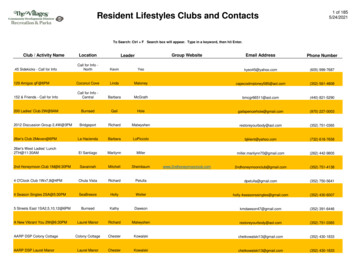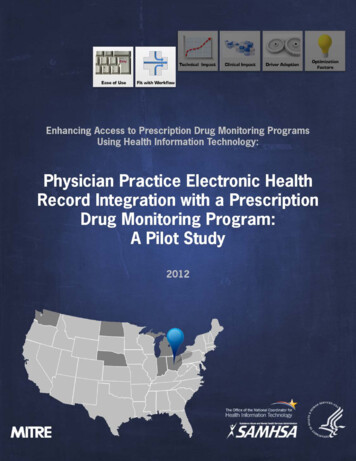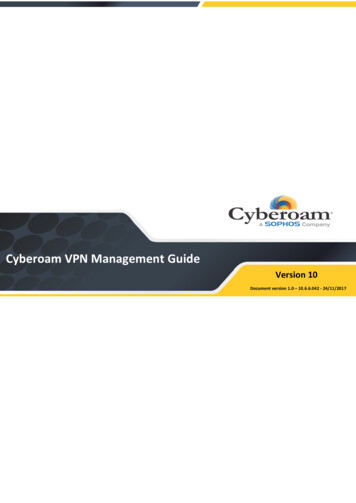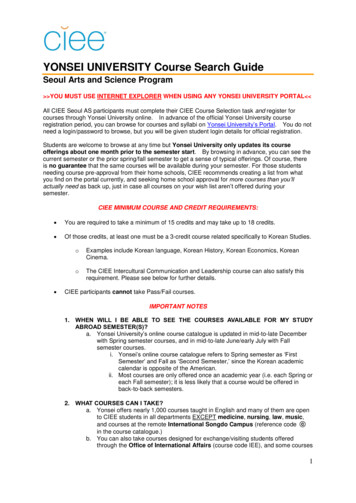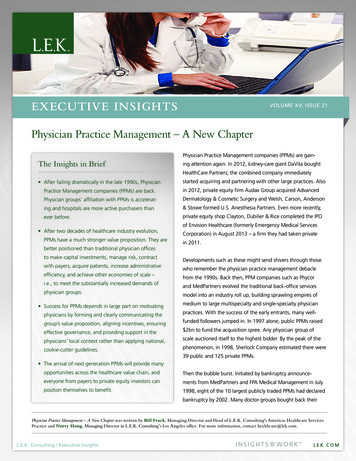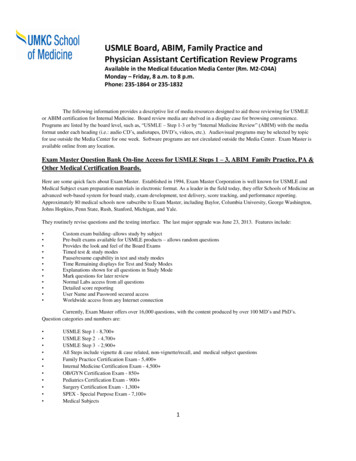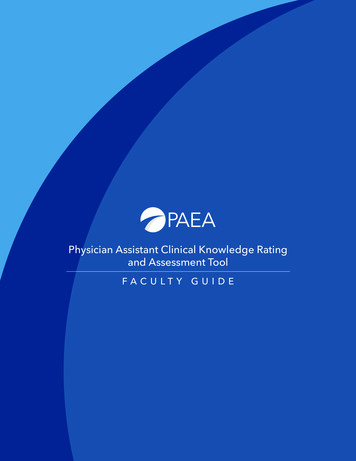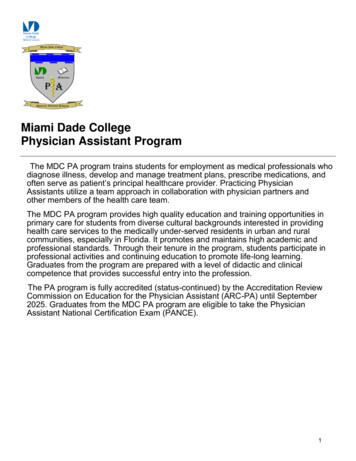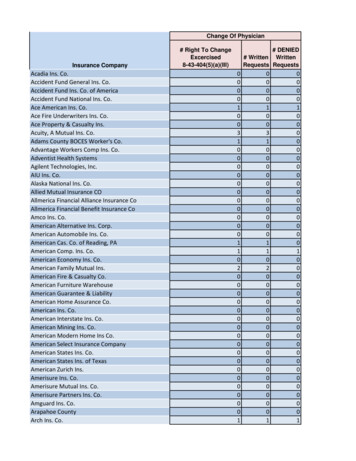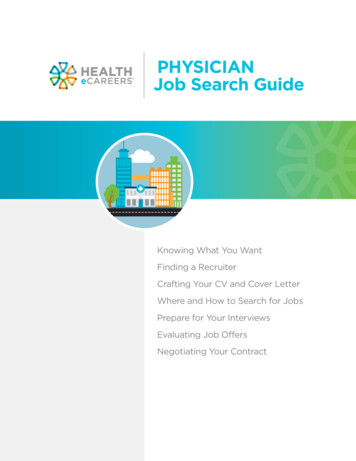
Transcription
PHYSICIANJob Search GuideKnowing What You WantFinding a RecruiterCrafting Your CV and Cover LetterWhere and How to Search for JobsPrepare for Your InterviewsEvaluating Job OffersNegotiating Your Contract
STEP 1 KnowingWhatYou WantWhether you’re an established physician looking for a newopportunity or a resident still completing your training, it’s nevertoo early to start the job-search process. If you’re a resident,the ideal time to begin researching your options is when you havetwo years or fewer left in residency. For a practicing physician,start looking 1–3 months before you’d like to make a move.SOLO PRACTICEPros: Total control Higher salaryThe first step — knowing what you want —sounds simple, but can actually be the mostdifficult part for many people. You need toask yourself this important question,and be brutally honest:Cons: Start-up costs Financial pressures Lots of administrative tasks Less opportunity forspecializationWhat does my ideal job look like?When answering this question, keep thesetwo important factors in mind:Location/Quality of LifeMULTISPECIALTY GROUPPros: Shared patient responsibility Opportunity to specialize Opportunity for collaboration Higher salary More referralsAre you flexible enough to relocate justabout anywhere if it’s the right job for you?Or do you only have specific geographicareas in mind? When narrowing downlocations, keep in mind options like whetheryou see yourself in a large urban area ora smaller rural one; what type of climateyou thrive in; and amenities like culturaloptions and outdoor recreation. If you havea family, you’ll want to consider their needsas well — for instance, will your spouse beable to find a new position in their field?Do you have kids who can’t easily (or won’twant to) switch schools? You should also beaware that salary can vary among locations.Find out what physicians make in your areaat Salary.HealtheCareers.comPRACTICE TYPEOTHER FACTORSRank your practice-type choices 1–13,with 1 being the environment youdesire most.Rank these priorities 1–11, with 1 beingthe most important to you. If you’recompletely flexible about location,skip this section.Medium-Group PracticeLarge-Group PracticeOutpatient Clinic/Urgent CareHospitalistLarge CitySmall TownJob Opportunities forSpouse/PartnerGood SchoolsPublic Health AgencyOther Family-RelatedConsiderationsStudent Health ClinicWarm ClimateGovernment (VA, Military, etc.)Cold ClimateResearchMountains NearbyAcademic PositionOcean/Lakes NearbyIndustry Position (Pharmaceutical,Devices, Insurance, etc.)Cultural AmenitiesAdministrative (Manager,Medical Director)2ACADEMICPros: Greater range of responsibilities(you teach as well as practice) Opportunity to specialize Opportunity for collaboration Opportunity for research Fewer administrative tasksCons: Lower salary More bureaucracySmall-Group PracticeDo you have a specific type of position inmind, or are you flexible? Are you set onjoining a private practice or a hospital, orwould you consider a student health clinic,a government position (e.g., VA), research,or academia? On the right is a list of prosand cons to help you narrow it down. Thenuse the checklists to rank your prioritiesunder both headings to see what pictureemerges. You might be surprised!Cons: Very little autonomy More bureaucracy Lower salaryCons: Shared control Potential personality differences More administrative tasksSolo PracticeType of PracticeHOSPITALPros: Shared patient responsibility Opportunity for specialization Opportunity for collaborationHealth eCareers’ Physician Job Search GuideOutdoor Recreation
STEP 2 Finding aRecruiter(If You Need One)Before you begin looking for a physician recruiter (also called asearch firm or placement firm) to help with your job search, youneed to determine whether you actually need one. Your answersin Step 1 will come in handy here.HOW TO FIND THERIGHT RECRUITERIf you’re set on a certain geographiclocation — especially if it’s an area alreadyflush with qualified candidates — then usinga recruiter probably isn’t the best option foryou. That’s because a practice/hospital ina highly desirable location likely has morethan enough candidates to choose fromwithout the employers needing to pay heftyrecruiter fees. Ask for recommendations fromcolleagues. Research companies that reach out toyou through the mail, email, industryevents, networking groups, etc. Log on to napr.org and aspr.org. Findrecruiters who are members of theNational Association of PhysicianRecruiters or the Association of StaffPhysician Recruiters. Membershipisn’t mandatory, but membersare held to a code of ethics andstandards of excellence.But if you’re willing to explore some ofthe unique opportunities that recruitersare often able to find — perhaps evensomething you hadn’t considered before —and if you’re willing to relocate if necessary,then it’s time to start searching for theright recruiter. Send your CV to a couple ofrecruiters who specialize in your areaof expertise or geographic location.Types of RecruitersInternal/In-House Recruiters:If you’re interested in working for a specificorganization, most large-group practicesand hospitals have their own internalrecruiters who can help you get in the doorand who are knowledgeable about thegroup’s philosophy, current physician mixand office culture. Interview a recruiter before signingon. Make sure you’re talking tothe actual person who will behelping you, not the sales orsupport staff. Find someone you’recomfortable with; it could be alengthy relationship. Ask questionslike whether they have experiencewith your particular specialty ordesired geographic area, how manyphysicians they place per year andhow long those physicians stay in thepractices they’ve been placed in.External/Independent Recruiters:These are third-party search firms (alsocalled placement firms) contracted bythe employer to help them find the bestcandidates. Such a firm may recruit forall positions on the healthcare spectrum,may recruit physicians only, or may focusonly on certain specialties or geographicareas. These recruiters will be able to shareopportunities from multiple employers.You should never be asked to pay anyrecruitment fees, as all placement fees arepaid by the employer, whether the firm ishired on a contingency basis (they’re paidonly when a candidate is hired) or a retainerarrangement (they’re paid either way).3Health eCareers’ Physician Job Search GuideDO’S AND DON’TSDO be honest. How will they knowexactly what you’re looking for unlessyou tell them? Make sure they know thetype of job you want and your salaryexpectations, as well as where youwant to live and whether you’re willingto relocate.DO ask questions. Keeping in touchwith your recruiter throughout theprocess isn’t just encouraged, it’sexpected.DON’T sign with more than one ortwo. An employer who receives yourCV from several recruiters will thinkyou’re having a hard time finding a jobor might believe you don’t know whatyou’re doing.
STEP 3 CraftingYour CV andCover LetterFor physician jobs, you’ll need a professional CV, which standsfor “curriculum vitae” in Latin and means “course of life.”A CV is longer than a resume – often 2-4 pages – and is adetailed record of your career and education.WHAT TO INCLUDEON YOUR CVYour CV is your first impression —a document to get your foot in the doorfor an interview — so it’s important to bethorough and accurate. Use the checklist atright to find out what to include. Choose aformat for each section (e.g., chronological,with most recent experience first) and stickto that format throughout.Contact details: Name, address,phone numbers and email addressWork experience: Name of practiceor hospital, location, job title, dates,summaryFellowshipsAnd whether you’re working with a recruiteror contacting employers directly, you’ll needa cover letter that grabs their attention;we’ve got some tips for writing those, too.Residency: Hospital/practice nameand location, specialty area, datesEducation: School names andlocations, dates, degrees earnedCover Letter FAQsAcademic honors/activities/leadership positionsQ: What’s the purpose of a cover letter?A: Employers might receive dozens of CVsfor the same position, so a well-writtencover letter is your chance to stand out.Make your opening sentence an attentiongrabber that makes the reader want tocontinue, but avoid sounding desperate.Research/publicationsProfessional membershipsLicensure/board certificationsProfessional awards/honorsQ: What should my cover letter include,and how long should it be?A: A cover letter should never be more thanone page. It should include a salutationto a real person (never “To whom it mayconcern”), an intro paragraph that explainswhich position you’re applying for and why,and a few highlights from your CV.Language skillsRelevant volunteer experienceReferences: Names, titles/positions,addresses, phone numbers,email addressesQ: Can I use the same cover letter forevery position?A: Every cover letter should be customizedto show that you’ve done your homework.Reference something unique about theorganization or a specific reason youbelieve this is the right position for you.Q: Can I email my cover letter and CV?A: Many cover letters and CVs aresubmitted electronically, either via emailor an online application tool, but some arestill sent through the mail or hand-delivered.If printing, use clean white paper and atraditional font. Whichever method youchoose, make sure you proofread! Ask a friendor colleague to be a second set of eyes.4Health eCareers’ Physician Job Search GuideDO’S AND DON’TSDO read other CVs for inspiration.Ask colleagues if you can perusetheirs, and search online for examples.Some websites offer templates youcan work from.DO use only high-quality paperand ink when printing your CV, andnever submit photocopies. If you’resubmitting your CV electronically, usea Word document instead of a PDF —this makes it easier for your recruiterto make changes and it’s vital foremployers who use keyword-scanningsoftware.DO ask colleagues, family andfriends to proofread your CVthoroughly for punctuation, spellingand grammatical errors.DON’T exaggerate any details aboutyour experience, and don’t guess aboutdate ranges.DON’T get fancy with unique typefacesor brightly colored paper thinking theywill help your CV stand out. (It will standout, but not in a good way.)
STEP 4 WhereandHow to Searchfor JobsWhen you’re looking for a job, it’s all about networking.You’ll want to let as many people as you can know that you’reactively searching for a new position. This can be done in avariety of ways: through networking groups, by discussing yourplans with colleagues and friends, and by taking advantageonline job boards and social media sites.WHERE TO SEARCH: ONLINE JOB BOARDSBefore you start using your social mediachannels to get the word out about yourjob search, take a critical look at each one,making sure there’s nothing questionablethat might lead employers to immediatelyplace your CV in the “no” pile. This meansdeleting any negative posts and photos,such as derogatory comments aboutyour current job. Other things to avoidare highly charged political or religiousposts, off-color jokes, and anything elsethat a potential employer could see as acharacter flaw or an embarrassment. Onceyour social media channels are cleaned up,you can start using them to network andsearch for positions.Healthcare job boards like HealtheCareers.com and PracticeLink.comGeneral job boards like Indeed.com and SimplyHired.comMedical association job boards like:Cardiology Careers (American College of Cardiology)ACOG Career Connection (American Congress of Obstetricians and Gynecologists)emCareers.org (American College of Emergency Physicians)Journal of the American Medical Association: JAMACareerCenter.comNew England Journal of Medicine: NEJMCareerCenter.orgSOCIAL MEDIA AND ONLINE TOOLSFacebook – If you’re openly searching, post a notice that you’re searching fora new position, and encourage friends and family to share your information.If you’re working with a recruiter, youmight not need to network or search asmuch, but you’ll still want to update yoursocial media channels and learn how to usethem to the fullest advantage.LinkedIn – Double-check your profile to make sure all of your details matchup with what’s on your CV. Make sure to turn off your activity when you’reupdating your profile. Otherwise, your connections will be notified of all theupdates you’re making. Search for and join LinkedIn Groups that pertain toyour specialty and other interests.Twitter – Again, if you’re openly searching, Tweet about your job searchfrequently and encourage retweets. Follow physician job boards, recruitmentfirms and hospitals/practices you’re interested in.Consider using physician-specific online communities and apps like Figure 1,Skipta, Doximity or SharePractice. Ask colleagues for recommendations.NETWORKING TIPS Keep your social media channelslike Facebook, LinkedIn and Twitterupdated, and post frequently aboutyour search. Accept invitations to networking andsocial events hosted by hospitalsand clinics. Bring copies of your CV. Join your medical association(both the national and state/localchapters) and keep an eye out forevents (including annual meetingsor conferences), webinars or othernetworking opportunities.5 Subscribe to industry trade journalslike NEJM and JAMA. Attend career fairs in your area.These events are often sponsoredby larger hospitals and clinics andsometimes by recruitment firms.Bring copies of your CV. Tell everyone you know. You neverknow which friend or colleague willknow someone who’s looking to hire.Health eCareers’ Physician Job Search Guide
STEP 5 Preparefor YourInterviewsYou scored a job interview! Now what? Since our first impressionsof people are formed within seven seconds of meeting them,it’s important to go into your interviews knowing how to act,what to say and what to expect.BEFORE TH
ACOG Career Connection (American Congress of Obstetricians and Gynecologists) emCareers.org (American College of Emergency Physicians)
